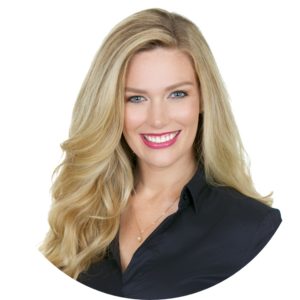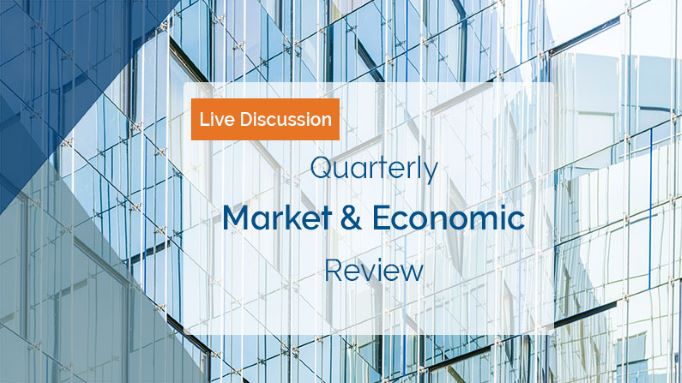A Reflection on Our Recent Webinar
April 20, 2022
By Vanessa Wieliczko, CFA, CAIA, CFP®
Chief Investment Officer, HoyleCohen
In the first quarter of 2022, the market experienced more significant volatility to the downside than we’ve seen in quite some time. The S&P 500 closed 3/31/22 down nearly 5%, with bonds also down to a similar tune on rising interest rates. While we’ve had lots of promising data in areas like employment and earnings growth, we’ve also seen inflation continue to run hot resulting in the expectation of more aggressive tightening of monetary policy by the Fed. What’s more, geopolitical risks have come front and center.
I recently had the pleasure of sitting down with John Emerson of Capital Group in a client webinar. John’s professional background uniquely positions his outlook on the political landscape and his view of the potential market impact. In addition to spending nearly 20 years cumulatively in financial services with Capital Group, John served as the U.S. Ambassador to Germany from 2013-2017 and spent 4 years serving as Deputy Assistant to the President under President Bill Clinton.
Below is a recap of John’s responses.
Since the Russian invasion of Ukraine there’s been unimaginable suffering and tragedy. By John’s assessment, Vladimir Putin’s primary objective may be to restore Russia to what he views as the former glory of the USSR. As Putin outlined in his essay titled “On the Historical Unity of Russia and Ukraine,” he doesn’t view Ukraine as a legitimate country. In his eyes, Russian society and culture began in Kyiv and expanded eastward. He fears a popular uprising against authoritarian rule and wants to bring the region back under Russian control.
Putin’s eyes had been on Ukraine for quite some time. When Ukraine started showing signs of being more westward leaning and flirting with the EU in 2014, it created significant discomfort for Putin. Upon taking office, Ukraine’s President Volodymyr Zelensky had made a real crack down on corruption which made him harder to control. The Ukrainian constitution was re-written in a way that it would be required to join NATO. However, the reality was that President Biden, Olaf Scholz and others had made it clear that Ukraine wasn’t being invited to join NATO.
So, why would Putin risk the massive imposition of sanctions when it was pretty clear that Ukraine would not be joining NATO? The world had a confluence of distractions going on and it may have been assumed that the reaction would be muted. There was a frayed transatlantic relationship, lots of political transitions in play, a continued public health crisis, inflation, not to mention little, if any, appetite in the U.S. for any military engagement. To date, world powers had exhibited fairly weak responses to Russian aggression and Putin may not have believed the threats about sanctions. Additionally, with Europe getting nearly 50% of its natural gas from Russia, he may have believed he had enough leverage to discourage sanctions based on the West’s energy dependence.
Six weeks into the conflict, it appears that Putin made three significant miscalculations. (1) The West did come together. NATO hasn’t been this unified since September 11, 2001. Germany in particular was likely a surprise to Putin as he had hoped Olaf Scholtz would be a friendly relative to his days with Angela Merkel. (2) Ukraine’s response. The Ukrainian military had been trained, and the people were broadly not supportive of Russian occupation. Patriotism and a desire for freedom is a force to be reckoned with. (3) Their own military capabilities. Logistics were not well planned and supplies like gas and food have been in short supply. It seems that many Russian forces have a lack of commitment to the cause.
Aside from the human toll, the top financial and economic impact of this conflict is playing out in the energy space. This includes the direct inflationary impact on people that need to heat their homes, as well as the massive effect on business and industry through supply chain disruption. For example, BASF, the world’s largest chemical manufacturer which feeds into the production of plastics, is vulnerable since it’s 100% powered by Russian gas. Sanctions are unlikely to go away anytime soon and we’re likely to continue to see loosening of environmental standards to offset Russian oil dependency. On the other hand, this may accelerate the innovation and development of renewables.
There could be additional impacts as well. Ukraine is widely considered the breadbasket of Europe so there could be an impact on food security throughout Europe, China, and Africa (i.e., Ukrainian citizens are probably not planting their fields right now and the oil and other resources needed to get food to market are impacted).
Many are asking where China fits into this picture. Both China and Russia have communicated a desire to create an alternative economic system to the West. Right now, China may be taking notes and considering how things could shake out in the event they did something similar with Taiwan. The West’s reluctance in engaging with nuclear powers may also play a role in China’s increased nuclear production. That said, China may have the world’s largest military but it’s a common perception that they are poorly trained, and they haven’t been in a conflict for many decades. Taiwan’s military isn’t battle hardened but they’re better armed than the Ukrainians were, and they have a geographical advantage as an island. There’s also a much greater co-dependance between Europe and China. China is dealing with its own issues including Covid outbreaks and a housing bubble, and it is likely a priority to ensure they don’t get into their own sanction situation. President Xi Jinping wants to get elected in the fall and while he’s in a good position to retain power, that’s less certain if China starts going into severe economic decline.
Shifting gears, we also discussed how upcoming mid-terms in the U.S. might impact the market. In John’s view, there’s a great likelihood that the House of Representatives flips to the Republicans. In this environment, it’s unlikely we’ll see much on the policy front other than bipartisan measures that are tough on China and Russia, pharmaceutical costs, or promote infrastructure spending. The silver lining is that gridlock tends to be a friendly environment for the markets as it breeds less uncertainty.
Monetary policy will continue to remain in focus as the Fed attempts the delicate balancing act of raising rates without putting the economy into a recession. In early April, the 2 and 10 year treasury curve inverted. Although the curve has since steepened, this is worth mentioning because the yield curve is often considered as an assessment of investor confidence in the market, with an inversion being a potential warning sign for an impending recession. That said, yield curve inversion is a really poor timing mechanism, and other yield curve measures have maintained their positive slopes. Historical data shows that a yield curve inversion isn’t typically followed immediately by a recession. On average historically, the S&P has gained 15% from yield curve inversion through the next market peak, with the peak being 24 months and the recession being 30 months from the inversion itself. Our assessment is that recession risks are likely to rise in 2023.
We’ve said it before and we’ll say it again, “it’s time in the market, not timing the market, that matters.” We expect diversification and stock selection to continue to provide opportunities in 2022. We encourage clients to have conversations with their Advisors regarding current allocations relative to long-term strategic targets.
As always, we appreciate your confidence and support as we seek to build portfolios for the long run. If you or someone you know would benefit from speaking with a HoyleCohen Advisor, we encourage you to reach out.
Your Hosts:

John Emerson
Vice Chairman
Capital International Inc.
John Emerson rejoined Capital Group in May 2017 as Vice Chairman of Capital International, Inc., following a four year leave to serve as the US Ambassador to Germany. With more than $1.5 trillion under management, Capital Group is amongst the largest investment managers in the world.
In 2015 John was awarded the State Department’s Susan M. Cobb Award for Exemplary Diplomatic Service, which is given annually to one non-career ambassador, and in 2017 he was awarded the CIA Medal and the U.S. Navy’s Distinguished Public Service award. Prior to accepting the ambassadorial posting, John was president of Private Client Services for the Capital Group Companies. Before joining Capital, he was deputy assistant to President Clinton where he coordinated his economic conferences, served as the president’s liaison to the nation’s governors, and led the administration’s efforts to obtain congressional approval of the GATT Uruguay Round Agreement and the extension of China’s MFN trading status. Additionally, he was appointed by President Obama to serve on his Advisory Committee for Trade Policy and Negotiations.
Before working in the Clinton White House, John served as Los Angeles Chief Deputy City Attorney, and was a partner in the law firm of Manatt, Phelps, Rothenberg, and Phillips. John holds an honorary doctor of laws degree from Hamilton College, a juris doctor degree from the University of Chicago and a bachelor’s degree in philosophy from Hamilton College. John is based in Los Angeles.

Vanessa Wieliczko, CFA, CAIA, CFP®
Chief Investment Officer
HoyleCohen, LLC
Vanessa Wieliczko oversees the firm’s investment department and leads the Investment Committee. She joined HoyleCohen in 2008 and helped develop the firm’s CorePlus approach, a unique blend of traditional and alternative assets. Vanessa holds a Bachelor’s degree in business administration and management with a concentration in international finance from Boston University.
Driven in pursuit of excellence, Vanessa obtained her Chartered Financial Analyst, Chartered Alternative Investment Analyst, and Certified Financial Planner designations all before turning 30. Active in the community, Vanessa serves on the board as President of the CFA Society San Diego, a group of more than 500 investment professionals.
Disclosure:
HoyleCohen is a fiduciary acting on behalf of our clients. We are a fee-based investment advisor and do not receive commissions for any investment strategies of products that may be discussed. Today’s discussion was intended for informational purposes only. No decisions regarding investment strategies should be made based solely on this presentation and nothing shared today should be interpreted as investment advice. Any investment decisions should be discussed with your Advisor. Finally, all investments carry the risk of loss, including the permanent loss of principal and past performance is not a guarantee of future results.


Thank you for the follow up on the recent webinar. I am sorry for not being available to attend the original discussion. These past several weeks have had a serious impact on the markets and my accounts have suffered considerably.
Let’s see what the Fed’s, next week, 50 basis points increase will accomplish.
Thank you,